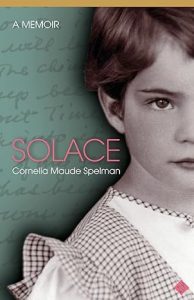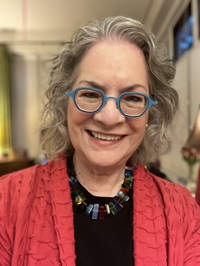Cornelia Spelman Interviews Her Younger Self
 SOLACE by Cornelia Spelman is told with “compelling frankness and consistent intimacy” (Naomi Shihab Nye, author of Everything Comes Next and Voices in the Air). It asks: how do we become the person we are? A portrait of the emotional legacies and psychological landscapes that shaped the author’s life, SOLACE unfurls in a series of vignettes drawn from diaries and personal stories about her relationship to others as daughter, mother, friend, wife, therapist, and grandmother. These are stories of compassion and attention bringing about healing from grief and brokenness and the necessity of our deep and caring connection to others: the comfort offered to us and the comfort we offer to others.
SOLACE by Cornelia Spelman is told with “compelling frankness and consistent intimacy” (Naomi Shihab Nye, author of Everything Comes Next and Voices in the Air). It asks: how do we become the person we are? A portrait of the emotional legacies and psychological landscapes that shaped the author’s life, SOLACE unfurls in a series of vignettes drawn from diaries and personal stories about her relationship to others as daughter, mother, friend, wife, therapist, and grandmother. These are stories of compassion and attention bringing about healing from grief and brokenness and the necessity of our deep and caring connection to others: the comfort offered to us and the comfort we offer to others.
Cornelia Spelman Interviews Her Younger Self
CMS: Cornelia, it is a unique pleasure to be able to talk with you today, considering that I am talking to my younger self! Tell me, what are the thoughts, dreams, worries, and preoccupations at the age of 45?
Cornelia: Gosh, being a woman involves so very many thoughts, dreams, worries, demands, expectations, pressures and preoccupations at any age, I imagine, but right now, it’s mostly that there is this false belief we women seem to have that it is possible to be everything. I want to be “everything”— a good mother, a good wife, to write things worth reading, to help others, and also to be happy. Yet it is impossible.
CMS: Why?
Cornelia: I have a twelve-year-old daughter and a twenty-year-old son and am married to a man not their father. My husband loves us, and also he has a career that demands he work full time, travel some, and sometimes spend evenings away from home. He does a lot more than most husbands do—he cooks, shares grocery shopping, laundry and (some)cleaning, but somebody needs to be home after school; take my daughter to the doctor; pick her up from school if she’s sick; help with homework; get school clothes and supplies; drive her to practice; listen to her and talk with her and laugh with her and know her friends. I want to be with her, but that doesn’t mean I don’t also want to be able to do, essentially, what my husband can do. And the only way that would be possible is if we both worked part-time.
CMS: But wouldn’t it be possible to have someone else do those things so you could do more of what you want to do?
Cornelia: Yes, if there was a grandparent who lived nearby it certainly would be a help, but there is no grandparent who does. And even if we had the money to hire someone, she could not be my daughter’s mother. I believe that a loving mother (and a father) cannot be replaced no matter how competent and warm the hired help (I am assuming these are parents who do not wish they never had a child).
CMS: Yikes! Are you saying that all mothers should stay home all the time?
YCMS: No. Not at all. Most mothers cannot stay home all the time even if they wanted to. And being home all the time is no guarantee of successful mothering. A good example is my former mother-in-law, who never worked outside the home yet smothered and bullied her children. My effort to be the kind of mother I want to be (and did not have, in my own mother, by the way , who was home all the time until my high school years) means I have needed to create my work around the edges of being a mother. It has worked pretty well, in that I feel I am fulfilling my responsibility to my daughter and my desire to be with her, while achieving some of what I would like to do and to be as a person apart from mothering.
CMS: Well, that sounds pretty good, so what is impossible?
Cornelia: It is pretty good. I’m not complaining. But the only really fair way, to mother and child, and even to father, is for both parents to work part-time and share all the rest of household and parenting responsibilities. And that seems impossible. Society is not organized to have both parents work part-time. Have you ever heard of a good, well-paying, full-benefits job that wanted only part-time workers? A part-time job that utilized your best skills, and gave you pleasure and satisfaction, and paid you enough, and offered advancement?
CMS: No. Unless, maybe, someone was a well-known artist who could set her own working time. But—what about a happy marriage? That doesn’t depend on what job you get or on mothering, does it?
Cornelia: An interesting question. The thing is, you are only one half of a marriage. You can do everything within your ability to have a happy marriage, but you have no control over what your spouse does and feels. What if your spouse is an alcoholic? Or turns out not to be the person you thought he or she was. This is not my problem, at 45, but then I was divorced already when I remarried. And most of the women I know want a happy marriage but can’t have it because their spouse is not interested in improvement.
CMS: Ok. Fair. Well, tell me something nice about being 45.
Cornelia: Oh, there are many nice things! You’re old enough to have decided some important things, like where you are living, whether or not you are a parent, whether or not your marriage is likely to last, and have made some sort of good-enough arrangement for work. You’re no longer young, but you’re not yet old, even if some people count 45 as being middle-aged. If you’ve done your best to be aware of what is of value to you, you can still reach for it. You’re in your physical maturity and if your health is good, you are living comfortably and without pain or major physical problems. You are having rich relationships with your child and with friends. You are approaching the time when your children will be out of the house and you will perhaps for the first time be free to turn around and look at where you have been and where you still want to go.
CMS: What is the most important thing you’ve learned by the age of 45?
Cornelia: I’m glad you asked that. It’s to try to remember what the Buddhist monk Thich Nhat Hanh wrote: “My appointment with life is in the present moment.” I want to feel when I am thirty years older that I was able to appreciate every dear ordinary day.
—
 Cornelia Maude Spelman M.S.W., is a writer, an artist, and former therapist. She is the author of picture books for children, including a series called “The Way I Feel,” and A Foot is Not a Fish, and the memoirs Missing and Solace. Her work has been translated into ten languages and sold over four million copies worldwide. Find her online: www.corneliaspelman.com.
Cornelia Maude Spelman M.S.W., is a writer, an artist, and former therapist. She is the author of picture books for children, including a series called “The Way I Feel,” and A Foot is Not a Fish, and the memoirs Missing and Solace. Her work has been translated into ten languages and sold over four million copies worldwide. Find her online: www.corneliaspelman.com.
Category: On Writing






























